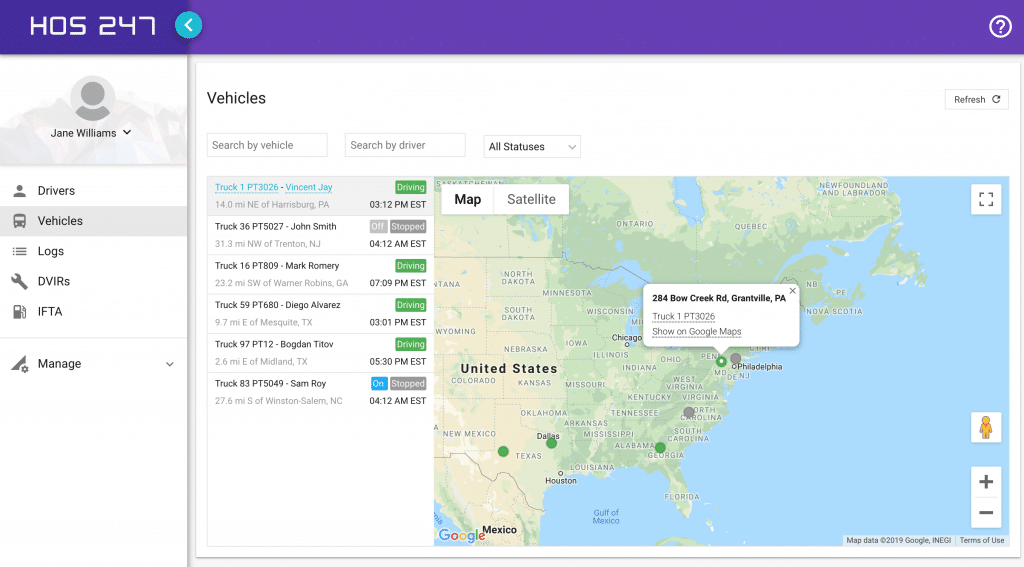GPS tracking technology delivers measurable benefits for fleets of every size, helping operators reduce costs while maintaining ELD compliance. New generation fleet truck tracking technology puts businesses in control of every vehicle in their fleet, providing comprehensive visibility into operations and driving significant improvements in productivity while reducing expenses.
Do you have any questions? Talk to ELD Advisor: 650-405-3372 or Request Callback
Gain Full Control Over Your Fleet With New-Generation GPS Fleet Tracking Technology
Businesses that rely on any sort of fleet to provide a service or product to their customers can experience significant benefits by utilizing the best 4G truck tracking solution available to them. This results in improved productivity and fewer expenses.
Reduce Fuel Costs
Reduced fuel costs are a major benefit to fleets that use GPS truck monitoring systems. Since many GPS solutions alert fleet owners when a truck is exceeding the speed limit, they can take measures to reprimand those drivers and, as a result, save on fuel usage that would otherwise increase as speeds increase.
It isn’t just fuel costs from speeding that can be reduced with a newer 4G truck tracking system. Excessive idling also contributes to unnecessarily high fuel costs. For example, drivers who use their truck as a climate control system or for breaks that can otherwise be taken outside the vehicle are wasting fuel and adding unnecessary fuel costs to their employer’s bottom line. The right fleet truck tracking system can alert owners when a driver is idling longer than a preset time so that the employer can address the issue and corrective actions when necessary.
Improve Driver Behavior
Another benefit of using real-time tracking for trucks is that it helps fleet managers address unauthorized vehicle usage and other unwanted driver behaviors. Speeding, extended idling time and tardiness can all be identified with GPS truck tracking systems. As a result, employers can enforce policies and encourage employees to be more productive. Quality fleet tracking solutions can also eliminate the need for manual, unverified timesheets.
Increase Safety and Security
A new GPS fleet truck tracking solution can also help boost fleet security and safety. For example, if a vehicle is stolen, it can be easily recovered if a hidden GPS receiver has been installed. As a result, expensive equipment can be more quickly recovered.
Improve Customer Service
Customer service is a vital component of any business, and dispatchers need to be informed with reliable information about their fleet in order to provide it. Reliable mapping software helps dispatchers identify the exact location of each vehicle, so they can effectively dispatch drivers to the nearest job sites when the need arises. They should also be able to provide customers with verifiable proof of service due to the ability to determine exactly when a truck arrived on-site and when it left.
Active Fleet Truck Tracking
Fleets that use passive tracking systems typically aren’t able to access GPS data until the vehicles return to base. Even GPS systems that claim to update in intervals of 5, 10 or 15 minutes aren’t live, so fleets are sometimes charged by their service provider for extra pings if they need to refresh their GPS outside of those intervals.
Active, real-time GPS tracking devices have earned their place in the trucking industry despite the fact that the price may be slightly higher. The reason is that their benefits are invaluable as they allow management to make important on-demand decisions that can actually result in cost-savings.
Utilize Precise Mapping Solutions
New-generation fleet tracking technology addresses the need for current and precise mapping by partnering with popular mapping providers. Some also provide live traffic information which can alert drivers to find an alternative route and avoid unnecessary delays.
Get Employees Onboard With Fleet Truck Tracking for Best Results
Investing in a 4G fleet truck tracking solution involves more than just the initial purchase. In order to see positive results, all employees need to be on board with the solution. The way to accomplish that is all in the approach. Make them aware that it isn’t just about monitoring them for bad habits; instead, it is about rewarding them for hard work and correcting any behaviors that can put them at a safety risk or cause financial loss for the business.
Benefits of HOS247 4G GPS Fleet Monitoring System for Trucks

Implementing a HOS247 GPS fleet tracking system is an easy way to save money, keep drivers safe and boost profits. Specifically, a HOS247 monitoring solution can provide the following benefits:
- Accessibility from anywhere. HOS247 monitoring software provides accessibility from any internet browser, allowing fleet managers to track and manage operations remotely.
- Added safety and security. Quickly locate stolen vehicles, monitor unauthorized use, and receive instant alerts in case of accidents, ensuring a faster response time.
- Lower costs. Real-time tracking helps fleets save on vehicle wear-and-tear, fuel costs and maintenance expenses, among others.
- Convenient maintenance reminders. The HOS247 fleet tracking system tracks vehicle maintenance schedules and sends automated reminders to prevent costly repairs.
- 4G technology. HOS247 utilizes 4G technology for fast, stable, and uninterrupted GPS tracking, ensuring real-time data transmission for efficient fleet management.
- Real-time fleet visibility. Fleet managers can monitor vehicle locations, speed, and driver behavior to improve efficiency and enhance overall performance.
- Comprehensive reporting tools. Gain insights into fleet operations with detailed reports on mileage, idle time, and more, helping managers make data-driven decisions.
HOS247’s GPS tracking system is designed to streamline fleet management, enhance safety, and maximize profitability. By leveraging advanced tracking technology and real-time data, carriers can reduce operational risks, improve productivity, and maintain compliance with ease.

What Other Features Are Needed for Your Trucking Operations in Addition to GPS Tracking?
In addition to new-generation GPS tracking, a successful trucking operation needs:
- ELD solution. Fleets need a reliable, top-rated ELD solution that is driver-friendly and FMCSA registered. It should also:
- Promptly make fleet owners aware of violations and help them pass DOT audits as a result.
- Reduce the risk of HOS violations.
- Be accessible anywhere and stay in compliance even in the most remote areas.
- IFTA mileage reporting. Fleets shouldn’t have to deal with the hassle of tracking mileage manually. Automated reporting eliminates the risk of human error.
- Fault code detection. Real-time engine diagnostic monitoring that:
- Alerts managers to potential mechanical issues before they become major problems.
- Provides detailed diagnostic information for more efficient repairs.
- Tracks vehicle health trends over time.
- Maintenance scheduling. Comprehensive maintenance tracking that:
- Automates preventive maintenance schedules based on mileage or time intervals.
- Maintains detailed service records for each vehicle.
- Sends alerts when maintenance is due.
- Idle time monitoring. Advanced idle tracking features that:
- Monitor excessive idling patterns across your fleet.
- Help reduce fuel waste and engine wear.
- Provide insights into driver behavior and training needs.
Integrating these essential features into your fleet management system creates a comprehensive solution that addresses the key challenges of modern trucking operations. By combining GPS tracking with these additional capabilities, fleet managers can maintain compliance, reduce operational costs, and keep their vehicles running efficiently. The key is selecting a provider that offers these features in an integrated, user-friendly platform that grows with your business needs.
HOS247 Is a Top-Rated Trucking Technology Provider
At HOS247, we are committed to providing truckers and fleet managers with reliable technology and top-tier customer support. Our goal is to simplify compliance, improve efficiency, and enhance safety with solutions that are easy to use. Here is why truckers choose HOS247:
- No contracts. We earn your business through quality service, not long-term commitments. Our subscription-based plans offer flexibility for growing fleets.
- Driver-friendly app. Designed with truckers in mind, our system is easy to use and works seamlessly on both iOS and Android devices.
- Quality hardware. Our GPS and ELD devices are built to withstand the demands of trucking, offering durability, accuracy, and seamless integration with your operations.
- One-year replacement warranty. We stand by the quality of our hardware. If any device experiences issues within the first year, we replace it free of charge.
- Reliable customer support. Our multilingual team is available seven days a week in English, Spanish, Russian, and Polish to assist drivers and fleet managers.
- Top-rated by truckers. Drivers and fleet managers consistently rank HOS247 among the best providers for reliability, ease of use, and customer service.
- Hassle-free returns. Test our system risk-free for two weeks. If it doesn’t meet your needs, return it for a full refund.
At HOS247, we prioritize our customers by offering dependable technology, flexible service options, and unmatched support. Whether you’re an owner-operator or a fleet manager, our solutions are built to help you succeed on the road.

Best GPS Fleet Tracking Providers
A well-chosen GPS fleet tracking system serves as the foundation for efficient fleet operations and regulatory compliance. The following providers offer proven solutions that address the core needs of modern fleet management.
HOS247
HOS247 delivers a complete fleet management platform that combines real-time GPS tracking with essential tools for modern fleet operations. Their system features straightforward pricing without long-term commitments, starting at $19 per vehicle monthly for ELD compliance and $22 for the full tracking package. The platform stands out for its user-friendly design and responsive multilingual support team. Key capabilities include live location monitoring, automated maintenance tracking, and comprehensive driver performance tools.
Geotab
Geotab focuses on advanced telematics and fleet optimization tools. Their system includes sophisticated route planning features and integrates with various safety technologies including dash cams. While pricing varies based on fleet requirements, their platform offers extensive customization options to match specific operational needs.
Quartix
Quartix provides straightforward GPS tracking designed specifically for small to medium fleets. Their system emphasizes ease of use while delivering essential features like real-time tracking and detailed route analysis. The streamlined interface makes it particularly suitable for fleets seeking core functionality without unnecessary complexity.
GPS Trackit
GPS Trackit specializes in solutions for fleets requiring detailed environmental monitoring. Their system includes temperature tracking capabilities alongside standard GPS features, making it particularly valuable for temperature-sensitive cargo operations. Custom pricing reflects the specialized nature of their offering.
Motive
Motive combines essential tracking features with advanced safety tools in a single platform. Their solution includes AI-powered dash cams alongside standard GPS tracking and compliance tools. The system offers self-installation options and customizable pricing structures to accommodate various fleet sizes.
Making Your Selection
When evaluating these providers, consider factors beyond basic pricing. Focus on how each system’s features align with your operational needs, including integration capabilities, support quality, and potential for scaling with your business. The right system should enhance your current operations while supporting your fleet’s future growth.
Key Features to Look for in a GPS Fleet Tracking Solution
When selecting a GPS tracking system for your fleet, certain features prove essential for maximizing efficiency and return on investment. Understanding these core capabilities helps ensure you choose a solution that aligns with your operational needs.
- Real-time tracking. GPS solutions should provide live vehicle location updates with refresh rates of two minutes or less. Look for systems that include historical route playback for thorough trip analysis and verification.
- Route optimization. Your system should offer route adjustment capabilities to reduce fuel costs and improve delivery times. Quality solutions include historical traffic pattern analysis for better trip planning, along with alternative route suggestions during unexpected delays. The ability to compare actual versus planned routes helps optimize future trips.
- Driver behavior monitoring. Comprehensive driver performance tracking helps reduce operational risks and costs. Advanced solutions provide automated driver safety scoring to identify training needs and recognize top performers.
- Maintenance management. Look for systems that automate maintenance scheduling based on actual mileage or time intervals. Automated service notifications ensure no maintenance task gets overlooked.
- Integration capabilities. Your GPS solution should seamlessly connect with other fleet management tools. Essential integrations include ELD systems for hours-of-service compliance, fuel card systems for expense tracking, and dispatch software for streamlined operations.
The ideal GPS tracking solution combines these essential features in an interface that your team can easily navigate and use effectively. Focus on finding a system that provides the capabilities most relevant to your current operational challenges while offering room for future growth.
Do you have any questions? Talk to ELD Advisor: 650-405-3372 or Request Callback
Common Mistakes to Avoid When Choosing a GPS Tracking Solution
When selecting a GPS tracking system, certain oversights can lead to significant challenges down the road. Understanding these common pitfalls helps ensure you make an informed decision that serves your fleet’s needs both now and in the future.
Inadequate Support Evaluation
Take time to thoroughly test a provider’s customer support before committing to their system. Contact their help desk during your typical operating hours to assess response times and support quality. Ask about their onboarding process, training resources, and ongoing technical assistance. A provider’s support capabilities often prove just as crucial as their system’s features.
Contract Term Oversights
Many fleet managers focus solely on monthly rates while overlooking other crucial contract elements. Review hardware replacement policies and potential additional fees carefully. Understand data usage limits and any associated overage charges. Pay particular attention to contract length requirements and early termination provisions. Clear understanding of these terms helps prevent unexpected costs.
Unnecessary Feature Complexity
While comprehensive feature sets might seem attractive, they can actually reduce system effectiveness if they don’t align with your operational needs. Choose a solution that matches your current scale and provides reasonable room for growth. Complex systems often lead to poor adoption rates and unused features that you’re still paying for.
Integration Limitations
Before selecting a system, verify its compatibility with your existing fleet management tools. Lack of proper integration can create inefficient workflows and duplicate data entry requirements.
Hardware Quality Compromises
Some providers offer attractively low monthly rates but pair them with lower-quality tracking devices. Research the reliability of the actual GPS hardware being offered. Consider the warranty terms and replacement costs. Quality hardware typically provides more accurate tracking and requires less maintenance over time.
The key to avoiding these mistakes lies in thorough evaluation of your needs and careful assessment of potential solutions. Focus on finding a system that provides the features you’ll actually use, backed by reliable support and clear contract terms. Remember that the best solution balances functionality with usability while providing room for your fleet’s future growth.
Conclusion
Selecting the right GPS fleet tracking solution requires careful consideration of your specific needs and operational requirements. Remember that the most expensive or feature-rich solution isn’t always the best choice for your fleet. Focus on finding a system that balances functionality with usability, ensuring that you’re investing in tools your team will actually use. Take time to evaluate multiple providers, test their customer support, and carefully review contract terms before making your final decision.

I’ve co-founded, built and managed several transportation-related businesses. Now, I’m a founder and CEO of HOS247 – an AI Transportation Platform for trucking companies, freight brokers and other logistics operations. We are transitioning old-style operations to technology-advanced logistics entities and help them to grow their businesses. ELDs (electronic logging devices), fleet tracking and management 2.0 combined with AI-powered dispatch tools.












How to Do a Truck Driver Log Book: Simplify Compliance with the Right ELD A trucker’s log book is a vital document that provides a detailed account of a CMV driver’s activities within a 24-hour period. In accordance with HOS

As a commercial motor vehicle carrier or driver, you need a truck logbook that complies with the Federal Motor Carrier Safety Administration’s regulations. The fact that FMCSA certified electronic logging devices do not necessarily fulfill all the necessary requirements complicates

The trucking industry is undergoing a significant transformation, driven by the need for increased efficiency, safety, and compliance. As the landscape of fleet management evolves, it is crucial for trucking companies to adopt innovative solutions to stay competitive in a